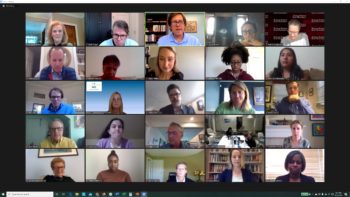Accelerate Recovery
The COVID-19 crisis and related recession threaten to be a generational setback for the educational equity gains we have made as a country since 2008. In the long run—without dramatic intervention—millions of Americans are likely to face significant hurdles that limit economic mobility.
ESG has put together a blog series digging into key areas for leadership to prioritize in their efforts to accelerate recovery for our country and our most vulnerable populations. Each new post will be added here over the coming weeks.
Introduction: Accelerating Recovery


Although critical health, social/emotional, and continuity of learning challenges must continue to take center stage, it is not too early to look around the corner and plan for what’s coming next. Those who are able to address the immediate crisis while also inspiring new, more nimble, and innovative approaches to educational pathways will set their communities up for short- and long-term success. ESG President Matt Gandal outlines five areas where visionary leadership and continued investment will be critical to our collective success.
Learn More

Give Students a Virtual Hand in the College Transition


Each year, nearly 2 million students in the U.S. graduate from high school and fail to enroll in a higher education program the following fall. Without dramatic intervention, this pipeline leak is in danger of becoming a gushing stream as students and communities deal with the effects of the COVID-19 crisis. How can states and communities take pre-emptive action during this health and economic crisis to avoid a major decline in postsecondary enrollment, especially for our most vulnerable student populations?
Learn More

Ensure All Pathways and Credentials Lead to Real Economic Opportunity


In this challenging economic environment, neither families nor our economy can afford to have individuals pursue dead-end pathways that do not result in credentials with real value in the evolving job market. With personal finances and local, state, and national economies stretched thin, it has never been more important that academic programs align tightly with the demands of the labor market. How can we we leverage real-time labor market information to improve student outcomes?
Learn More

Prepare Colleges to Serve Out-of-Work Adults


The ripple effects of the COVID-19 pandemic have resulted in the loss of millions of jobs. Though some of these job losses are temporary, others will be permanent. As they look for ways to return to work, many newly-unemployed individuals will decide to boost their employability through additional postsecondary education and training. It will be imperative that states and institutions are ready to support these adult learners — along with traditional college students — in successful completion of a postsecondary degree or credential of value.
Learn More

Double Down on FAFSA Completion


With families facing deep financial hardship due to the COVID-19 crisis, completing the Free Application for Federal Student Aid (FAFSA) is more important than ever. We know that, particularly during an economic downturn, a postsecondary degree or credential is key to opening the door to economic opportunity. Yet, faced with uncertainty of what the future might hold, many students are reconsidering their postsecondary plans, choosing to go to a college that is less expensive or closer to home, or deciding to defer their college plans entirely.
Learn More

Stop the College Readiness COVID Slide


The COVID-19 crisis continues to lay bare the reality that a postsecondary credential is the safest bet for an individual’s long-term economic stability. The most recent unemployment figures may be the harshest reminder yet that, in the aggregate, the answer is resoundingly “yes” to the age-old question, “is college worth it?” Even before the pandemic, the number of students not placed in postsecondary credit-bearing coursework was staggering. With significant academic disruption for graduating and rising high school seniors, the need for academic supports to succeed in credit-bearing college coursework is likely to grow dramatically.
Learn More

Keep the Attainment Agenda Front & Center


A renewed commitment to increasing postsecondary attainment is at the heart of a successful and equitable economic recovery strategy in the months and years ahead. Last week, ESG and SHEEO virtually gathered leaders from seven states across the country for the second convening of the Attainment Academy. Although nearly every aspect of postsecondary education looks different now than it did when the Attainment Academy cohort began working together in October 2019, last week’s conversations revealed that the core elements of the higher education attainment agenda remain unchanged—and in fact, are more urgent now than ever before.
Learn More

Expand Access to Shorter-Term Credentials that Lead to Good Jobs


Our education and workforce leaders will need to quickly prepare for how tremendous growth in displaced workers will impact postsecondary institutions and workforce programs. Higher unemployment is likely to lead to an increase in enrollments in community and technical colleges and create greater demand for shorter-term, non-degree credentials that lead to good jobs. Unfortunately, we also anticipate false promises—“make money quickly by completing this program”—to creep into communities whose members can least afford to turn the wrong way on their future career path.
Learn More

Spotlight: D.C. Expands Support for College-Bound Grads


The District of Columbia Public Schools (DCPS) recently announced a first-of-its-kind program to support DCPS alumni as they transition to and through college. Supported by the DC Public Education Fund through a generous investment from the A. James & Alice B. Clark Foundation, DCPS Persists aims to increase the district’s college graduation rate by 10 percentage points.
Learn More

Three Months In: Inequitable Impact and the Education Alignment Imperative


Three months into the coronavirus pandemic, millions of Americans—particularly people of color and low-income individuals—are still struggling, even as the economic freefall has begun to show signs of slowing. A look at where we are as of mid-June and the strategies we must prioritize to facilitate an equitable recovery for all.
Learn More


